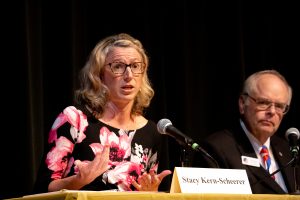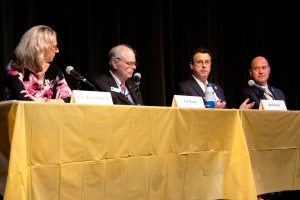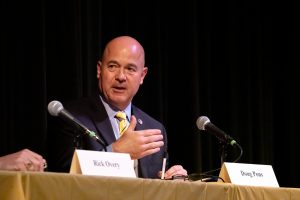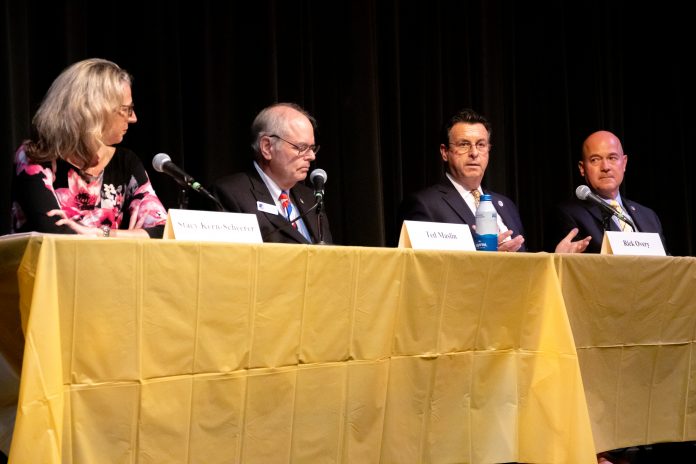Monday, Sept. 12, the Downtown Neighborhood Alliance and the Burns Lane Residents Alliance hosted a Williamsburg City Council candidate forum in the Williamsburg Regional Library auditorium. The first of many forums prior to the Nov. 8 election, the discussion was aimed at addressing downtown Williamsburg neighborhood issues. Candidates included Stacy Kern-Scheerer J.D., Richard “Rick” Overy, current City Council incumbent Ted Maslin and Williamsburg Mayor Doug Pons.
With both students and residents in attendance, candidates addressed off-campus student housing, resident concerns, downtown relationships with Colonial Williamsburg and other highly-contested neighborhood topics. Moderator Jim Heller allowed each candidate one minute for opening statements, one minute for each question response and two minutes for a final closing statement.
Kern-Scheerer, a professor at the William and Mary Law School and director of the law school’s Immigration Clinic, said in her opening statement that she has been a resident of Williamsburg for the past 13 years, and that she is the only candidate that currently has a young child in Williamsburg’s public school system.
Maslin, a graduate of the College of William and Mary, emphasized his dedication to the Williamsburg community and his passion for providing a “common sense” approach to community projects.
Overy said that he has been working to discover what makes Williamsburg a successful community with an atmosphere that supports all people.
“I’ve identified five groups of people who I believe are responsible for the success or lack of success for town-gown relationships near the College in particular,” Overy said. “The residents, the student residents, the property owners, the College and the city.’”
Lastly, Pons highlighted his commitment to the community since the 1960s. Pons has served on the City Council for the past 12 years and stated the importance of his work providing housing for those who are in precarious housing conditions.
Each candidate also mentioned the importance of the City Council within the realms of policymaking, community relationships and solution-oriented strategies.
When asked about their top priorities for the city, Overy and Maslin both discussed the importance of implementing expanded parking within all downtown areas. All four candidates also mentioned economic development and an increase in community spaces. Kern-Scheerer stated the possibility of expanding the role of the College downtown in order to grow and accommodate all community members.
The organizing committee also presented issues related to relationships with Colonial Williamsburg, a prominent institution within the Williamsburg community. Though all candidates agreed that the current relationship between the two was beneficial and positive for both parties, some also mentioned planning for the future, as well as the potential for economic expansion.
“The leadership of Colonial Williamsburg will not always be this leadership,” Kern-Scheerer said. “So we also need to make sure that as a city, the leadership is always looking forward to say ‘Okay, who’s coming next that’s going to lead CW and how do we make sure we keep this tone a partnership not just through this CW administration, but also to the next one.’”

Overy emphasized the importance of the partnership between Colonial Williamsburg and the city. Colonial Williamsburg now relies on the city for much of its marketing and visitation, and has offered land to develop resources like cultural arts centers and sports facilities.
Next, the forum transitioned to what could arguably be the most contested issue candidates will face during this upcoming election: student-resident relationships and housing debates. With both students and locals in attendance, all four candidates faced pressure to address the concerns of permanent residents, homeowners and students.
The first question from the organizing committee concerned the College’s plan to expand undergraduate student enrollment as well as reduce dorm room space, referring to the College’s ten-year Comprehensive Facilities Plan released in April of this year which will keep the number of “beds” on campus the same. The question addressed what the candidates would do to not only preserve, but expand, owner-occupied housing downtown.
Kern-Scheerer urged all community members to step back and look at which goals are both realistic and accommodate all residents — owners and renters alike. Her suggestions included the expansion of mixed-use properties and the study of affordable housing proposals.
Pons, however, mentioned that housing overflow would impact the entire community, and suggested that the College continue to evaluate its need for additional beds in order to accommodate the growing student population.
“There is a new conversation that I have heard in the past in terms of joining into private-public partnerships to add additional housing, and hopefully that will be on campus,” Pons said. “There’s no scheduled timeline for that, but I think that’s got to be a solution.’”
Overy said that with the addition of Midtown Row and Griffin Arms Apartments, the expansion of student housing has provided an opportunity for both residents and students to live together. His hope is that these newer housing options will relieve pressure on neighborhoods.
Maslin recalled that the College’s initial plan to close Brown Hall and shut down One Tribe Place for renovation earlier this year resulted in community outrage and a need for 600 beds.
“for a university which prided itself for data-driven decision making during the pandemic, and rightly so, this miscalculation was very disturbing.”
“Let’s be frank, for a university which prided itself for data-driven decision making during the pandemic, and rightly so, this miscalculation was very disturbing,” Maslin said. “With our collective voices chiming in, William and Mary reversed this decision to close One Tribe Place in the near term.’”
In relation to the College’s plan, candidates also urged the construction of additional parking lots on campus to decrease parking pressures in local neighborhoods, with Maslin remarking that the College should reconsider some of its construction priorities in order to accommodate student and community needs.
Other questions regarding housing concerned unkempt properties, speeding and noise complaints. Overall, all four candidates were supportive of student off-campus housing, though they did acknowledge residents’ concerns about student renters.
“Unfortunately there seems to be problematic houses scattered throughout the city. But by and large, students living off campus are good neighbors and I think most of us would agree to that,” Pons said. “When we identify these houses that are routinely a problem, the two police departments will get together and have a conversation and engage with the tenants of the house, the landlords of the house to see if there isn’t a remedy to the problem before it escalates.’”
Overy, Kern-Scheerer, and Maslin all emphasized the importance of retaining positive neighbor relationships and that creating a relationship with neighbors would assist with creating beneficial individual solutions to resident complaints.
“We’ve got a new school year,” Overy said. “It’s time to welcome the students as you would any neighbor and give them your contact information and meet them before it becomes a problem. Students, those of you who live off-campus, introduce yourself to your neighbors, give them your cell phone number and say ‘I’d love to hear from you.’”
Kern-Scheerer emphasized the importance of identifying the real problems when it comes to neighborhood housing concerns.
“Instead of turning one issue into just one big massive, like, ‘there’s something wrong,’ really what’s the problem?” Kern-Scheerer said. “I think the second thing is to make sure that city leadership sets a tone of inclusivity and really walks the walk.’”
Heller also asked the candidates about neighborhood balance, initiating a conversation about housing renovations and increased home ownership. Overy said that his goal would be to have students living as residents in the community. He also suggested providing a tax credit for renovating homes to encourage homeowners to move back downtown.
Maslin discussed the lack of renters in many neighborhoods within Williamsburg, and introduced the idea of an Adopt-a-Neighborhood program without a homeowners association, but with the creation of informal positive relationships.
Kern-Scheerer emphasized the importance of holding landlords accountable, stating that a landlord certification program could help with property maintenance as well as an annual report regarding town-gown relations. She also mentioned the possibility of converting hotels into more affordable housing.

As Heller began asking questions from the audience, there was a clear shift in the urgency of issues being addressed, with one question defining the College’s expansion of housing as “encroaching” upon the community. Other questions addressed the three-person rule —a state and city code decree that only three unrelated individuals can live together in a residence — holding landlords accountable, increases in rent, traffic, noise ordinances and student support.
In regards to the three-person rule, Maslin, Pons and Overy all voiced their support for the decree, though they mentioned the recent three-year moratorium on the City of Williamsburg’s decision to allow renting to four unrelated people. Kern-Scheerer, however, stated that she believes the number of people in a residence to be unrelated to neighborhood concerns.
“You can have three people make a whole lot of noise, and you can have four really quiet people. What I really think it comes down to, again, what are the problems we’re trying to solve? I actually think we’re getting distracted from really what the problems are and that’s noise or property maintenance. And so we want to keep our eye on solutions that actually fit the problem,’” Kern-Scheerer said.
The question of noise ordinances also caused quite a stir in the audience, as a question posed to the candidates mentioned the possibility of changing noise ordinances to an earlier time, with the existing noise ordinance set at 11p.m.. With much confusion from both Heller and the candidates, conclusions were drawn that this possibility was not currently on the City Council’s radar.
“If people are too noisy next to you, I hope the first course of action is to address the person who is too noisy.”
“I’ve suggested throughout the evening that we have plenty of ordinances and plenty of studies, and that we just need to use the existing ones that we have and enforce them where needed,” Overy said. “If people are too noisy next to you, I hope the first course of action is to address the person who is too noisy…but I’m not in favor of changing the current ordinances.’”
The three other candidates also emphasized the importance of being good neighbors, communicating when needed and avoiding police intervention when possible.
Another solution posed to neighborhood concerns was holding landlords accountable for unkempt properties and rowdy residents.
Maslin said that student renters often cannot get in contact with landlords in order to assist with unkempt properties and maintenance, again emphasizing Adopt-a-Neighborhood programs that could potentially get the City Council and building department involved to help.
Kern-Scheerer recommended going to the General Assembly in order to adjust property maintenance standards. Pons then brought up the current Code Compliance enforcement process to assist with issues visible from the street.
“I think the biggest concern I have is for students that have lived in fear of their landlords, is that they call Code Compliance and they may get evicted,” Pons said. “Part of the Rent Ready program that we’ve been talking about and trying to get off the ground is to have a standardized lease.’”
Pons said that through this program, landlords would be able to go through an inspection process as well, and urged the College to buy into this program in order to require students to live in homes that have been inspected for safety purposes.
The final question of the forum encompassed many students’ concerns, asking what the candidates would be willing to do to help resolve the student housing crisis and lack of affordable housing in the City of Williamsburg. Though all candidates agreed that solutions to this issue would have to be implemented over many years, all four candidates agreed that affordable housing options would eventually need to be expanded.
“This is a multifaceted problem, and so there’s going to have to be multifaceted solutions. There is not a magic bullet.”
“This is a multifaceted problem, and so there’s going to have to be multifaceted solutions. There is not a magic bullet,” Kern-Scheerer said. “With respect to the rights of the students, I think we’ve talked about how we can educate and maybe empower students vis-à-vis landlords and living where they choose.’”
Pons said that housing would most likely have to be expanded outside the City of Williamsburg, and again emphasized the importance of implementing a standardized lease and Rent Ready program.
“I think it might be easier to address world hunger,” Overy joked. “I don’t want to see people moving out of our community because we can’t live comfortably and safely together. I also want to make sure that students always feel welcome in our community… I don’t think additional policies, procedures, hard headed rules from the City Council or the state government are going to help. I think it’s really an opportunity to work together in this community.’”
Maslin reemphasized the recommendation to convert more hotels into affordable housing options, and restated the importance of Midtown Row and various other apartment complexes.
Ending with closing statements, each candidate expressed their appreciation to the audience and hosts of the event. Pons began by stating his goals for the city by 2026, emphasizing growth in economic diversity, tourism, public school resources, employment rates and housing, as well as his commitment to the community during his time as mayor and on his prior position on City Council.
“This has been a productive discussion, but I also encourage you to address each one of us individually,” Overy said in his closing remarks. “I also think we shouldn’t let perfect be the enemy of good, so we should be willing to move forward with incremental changes for the better, and admit when we’ve made mistakes.’”
Maslin highlighted his previous success on City Council, and he asserted his passion for collaborating with the community, bringing a sense of urgency to projects and his ability to devote much of his time to City Council.
Kern-Scheerer finished the forum by stating her commitment to any issue posed to the City Council, as well as emphasizing her prior experience in the political system.
“I worked on Capitol Hill for ten years as a public servant lawyer,” Kern-Scheerer said “I worked for the U.S. Senate and the institution itself. I worked for all parties, all senators. And my job was to help them turn their ideas into solutions.I come at this role with both my experience in D.C. and here as a community lawyer, as somebody who’s a mom and a community volunteer who is strongly committed to the future of Williamsburg.’”

After the forum, all four candidates stayed to address comments and concerns from various audience members, as well as acquaint themselves with those in attendance. With many students present, some wanted to follow up with the candidates in order to personally express their concerns about student housing and town-gown relations.
Blake Batchelor ’23 and James Turner ’23 said that their landlord had suggested they attend the forum due to resident-student tensions, and to help represent the student body and student rights.
Turner emphasized that he feels there is persistent anti-student sentiment within local neighborhoods, especially as the College’s guidelines force many students into off-campus housing.
“If we don’t step forward, no one will,” Turner said. “These people that live here next to the College, in our minds, should expect to live in congruence with students, but they often just put their thoughts and opinions first and think that the rights of students don’t really matter.”
Batchelor said that though he understands the resident concerns, there’s an incongruence between what residents expect and what the reality of student housing becomes, especially as more students are forced off-campus due to the quality of dorms or lack of on-campus housing.
“We wanted to go out there and show our support for the students’ rights, especially given some of the recent proposals,” Batchelor said. “We want our students to have the best possible college experience, and we think that a lot of that rides on this possible election.”
Midterm elections will be held Tuesday, Nov. 8, 2022. The City of Williamsburg Election Office will be open Monday-Friday 8a.m.-5p.m, Saturday, Oct. 29 and Nov. 5 from 8a.m.-5p.m and on Election Day from 6a.m.-7p.m. for in-person voting and absentee ballot drop-off. The last day for absentee ballot drop-off is Saturday, Nov. 5.

